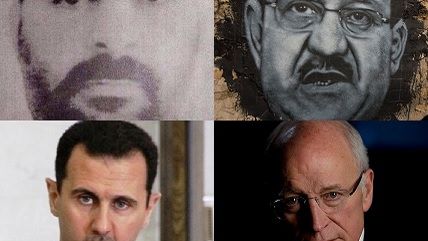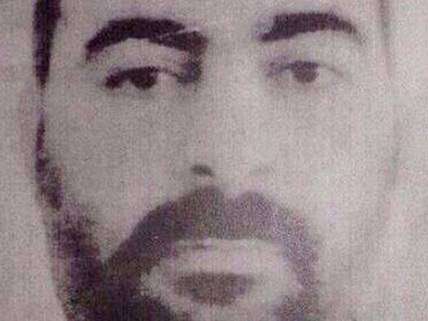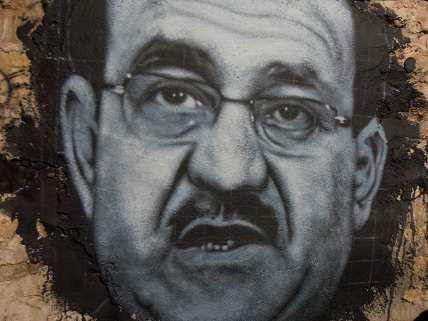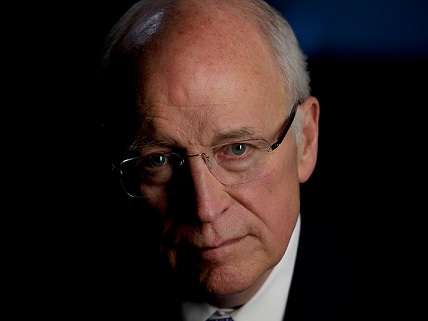Four People to Blame for the Crisis in Iraq
Failure's no orphan

For Iraq, June has been the cruelest month. The jihadist group Islamic State in Iraq and Syria (ISIS) has made incredible gains in Iraq. On June 5, ISIS fighters briefly seized Samarra before being pushed back by Iraqi government forces. On June 10, ISIS seized Iraq's "second city," Mosul, on the crossroads between Iraq and Syria, another area of operations for ISIS. On June 15, ISIS claimed to have captured and killed 1,700 Iraqi soldiers in Tal Afar. A few days later they attacked a major oil refinery north of Baghdad, one that was responsible for about 25 percent of the country's domestic oil consumption. As Iraq verges on the brink of civil war, there's a cornucopia of Iraqi and foreign figures who could be blamed for the unfolding disaster. Here are four:
1. Abu Bakr al-Baghdadi

Abu Bakr al-Baghdadi—not his real name—is the leader of the Islamic State in Iraq and Syria, and as such, the primary blame for the crisis ISIS has precipitated in Iraq lies with him. Al-Baghdadi may have been a cleric in Samarra when the U.S. invaded in 2003 and according to a BBC report, he may have already been a radical then, or he may have been radicalized while spending four years at a U.S.-run prison for Al Qaeda commanders in Iraq. Al-Baghdadi became the leader of Al Qaeda in Iraq, one of the organizations that evolved into ISIS, in 2010. Al-Baghdadi has avoided the spotlight, unlike his predecessor, Abu Musab Al-Zarqawi, a showman who was eventually traced down and killed by the U.S. in 2006. While ISIS may be linked to Al Qaeda, it has not been a subordinate. At The Washington Post, David Ignatius reported that ISIS was "so toxic that it's disowned by Al Qaeda and is feuding with Al Qaeda leader Ayman al-Zawahiri." Al-Baghdadi is apparently even poaching jihadists from other Al Qaeda affiliates, including those in Yemen and Somalia.
2. Nouri al-Maliki

Nouri al-Maliki has been the prime minister of Iraq since first being elected in 2006. He won re-election narrowly in 2010—his party finished second but he managed to cobble together a governing coalition—and in 2011 he promised not to run again. "Eight years is enough for him, in order to not convert to a dictatorship," his media advisor told the Associated Press. He promised, too, that al-Maliki would back a constitutional amendment limiting prime ministers to two terms. Eventually, al-Maliki's opponents passed a term limit law, opposed by al-Maliki and rejected by the Iraqi Supreme Court as unconstitutional. Since then, al-Maliki has arguably been at work converting his rule into a dictatorship. He has been accused of numerous human rights abuses, and an incident last April in which he sent military forces to target Sunni protestors (al-Maliki and his ruling party is mainly Shi'ite) may have provided the opportunity for ISIS to scale up and expand its militant campaign.
A Congressional Research Service (CRS) report issued earlier this month (PDF) described the April 2013 incident. Three days after the beginning of that year's provincial elections, al-Maliki sent Iraqi security forces to a protest camp established by Sunnis in Hawijauh. The CRS report claimed that after this incident, "many Sunni demonstrators and tribal leaders took up arms and called on followers to arm themselves," that some Sunni gunmen took over government buildings in another town, and that Iraqiyya, a majority Sunni political party, pulled out of Iraq' national legislature. According to the CRS report, U.S. officials urged al-Maliki not to use the military to crack down on Sunni protestors because "such a strategy has led to all-out civil war in neighboring Syria" and that al-Maliki should instead work with Sunni tribal leaders to de-escalate the situation.
There are signs, too, that the Iraqi population that has found itself living in territory controlled by ISIS. One Vice correspondent in Iraq reports that in Mosul ISIS has found some support among local residents, who say life is calmer under the jihadi group and that the jihadists' strict interpretation of Islam has not yet been imposed. One Sunni resident told Vice that the takeover of Mosul by ISIS was "an uprising against the tyranny of Maliki." While in Iraq this week, Kerry uged Maliki to form an inclusive government. Two months after being re-elected to a third term he promised not to seek, al-Maliki has yet to form a governing coalition.
3. Bashar Assad

Bashar Assad has been the president of Syria since his father, who was also president of Syria, died in 2000. Three years ago, anti-government protests in Syria erupted, the tail end of a string of regional protests dubbed the "Arab Spring." Those protests eventually saw the overthrow of long-time heads of state in Egypt, Tunisia, and Libya, the last of which was aided by a U.S.-backed intervention. In Syria, 5,000 people had been killed in government violence by the end of 2011. What began as a pro-democracy protest movement had by then turned into a civil war, with army deserters forming the Free Syrian Army, one of the first of many rebel groups to operate in Syria since then. As it had been in Libya, whose protests too turned into a protracted civil war, the fight was joined by more radical groups. At the beginning of 2012, the Al-Nusra front, eventually identified as an Al Qaeda affiliate, had established itself in the country. Opposition activists at the time blamed some of the terrorist activity on false-flag operations by the government, while the government blamed Al Qaeda. By 2013, the Islamic State of Iraq, which evolved into ISIS, was also operating in Syria, targeting moderate rebels.
Assad had been promising democratic reforms in Syria for years but not acting on it. His response to anti-government protests in his country involved acts like beating up a political cartoonist critical of the regime. His decided to treat the protests as a military problem and used the military to solve it, which had the effect of turning the protests militant and allowing jihadist groups to enter the fray. The Islamic State of Iraq largely became ISIS (the Islamic State in Iraq and Levant) because of the opportunity presented by Assad's war of choice in his own country to take their fight there, something not even Al Qaeda seemed to want. When al-Baghdadi announced the Islamic State of Iraq and al-Nusra were merging, al-Nusra denied it, reconfirming its commitment to Al Qaeda, while Al Qaeda leader Ayman al-Zawahiri "ruled" that al-Baghdadi and the Islamic State of Iraq remain there.
4. Dick Cheney

Last weekend, Sen. Rand Paul (R-Ky.) said he couldn't blame the crisis in Iraq on President Barack Obama. On the other hand, he said he blamed the unrest in the region on the Iraq War. Indeed, the U.S. war in Iraq, and the chaos created by the overthrow of the Hussein regime and the dismantling of the Baath government, is the reason Al Qaeda was able to establish itself in Iraq and the region. Dick Cheney, when he was secretary of defense under President George H.W. Bush, understood that marching U.S. troops into Baghdad during the First Gulf War would be a "bad idea," as he explained in a 1994 C-SPAN interview. "Once you got to Iraq and took it over, took down Saddam Hussein's government, then what are you going to put in its place?" he asked. "That's a very volatile part of the world." His main fear was the volatility would see Iraq carved up by neighbors like Syria and Iran. What changed between then and the U.S. invasion in 2003? Certainly none of the facts on the ground in the region. Instead, the only thing that changed was 9/11 and its use in policy and decision-making to suspend rational thought.
In the 1990s Dick Cheney understood invading Iraq would be a quagmire. He became George W. Bush's vice president after leading the search committee in 2000 for Bush to find his running mate. President Bush said he chose him because of his vast experience (his career at the White House began as an assistant to President Gerald Ford; he was eventually his chief of staff) and the insight he could provide on issues Bush's time as governor of Texas didn't give him experience in. Among the most important of these were foreign policy issues. In 2000, Bush ran on a platform of no nation-building. The fundamentals that made that good policy remained after 9/11 but, driven by Dick Cheney's idea that the war on terror would last a lifetime, were ignored, to disastrous result. More than 12 years after entering Afghanistan the nation-building project is a disaster—97 percent of the country's GDP is foreign spending, both military and humanitarian. Less than three years after leaving Iraq the nation-building project there is looking similarly doomed, something Dick Cheney circa 1994 knew would happen.
Editor's Note: As of February 29, 2024, commenting privileges on reason.com posts are limited to Reason Plus subscribers. Past commenters are grandfathered in for a temporary period. Subscribe here to preserve your ability to comment. Your Reason Plus subscription also gives you an ad-free version of reason.com, along with full access to the digital edition and archives of Reason magazine. We request that comments be civil and on-topic. We do not moderate or assume any responsibility for comments, which are owned by the readers who post them. Comments do not represent the views of reason.com or Reason Foundation. We reserve the right to delete any comment and ban commenters for any reason at any time. Comments may only be edited within 5 minutes of posting. Report abuses.
Please to post comments


It's -way- easier to blame Bush than some guy who's name I can't pronounce.
Plus it won't threaten your social standing in DC.
Look, do you want to keep your access to cover the Supreme Court or not?
There are signs, too, that the Iraqi population that has found itself living in territory controlled by ISIS.
Is this a land where airboats run free and gators don't exist?
That comment is totally McQueen.
Ed Krayewski on Who's to Blame for Iraq
Oh, I know this one! His mom?
That's what I was going to say. Though it might be your mom.
Ed Krayewski is Who's to Blame for Iraq
I first read this way and thought, if you are going to attempt to blame individuals for what amounts to massive tribal stupidity, on all sides, you might as well blame Ed.
I suggest that we blame Iraqis and the foreign fighters for the current mess in Iraq.
They aren't children. They have agency. They are certainly primarily responsible, are they not?
How dare you suggest the Iraqi people aren't all the puppets of BOOOOOOOOSSHHHH
It wuz Cheney wot dun it. Dittn you read the artikul or lookit the pitchers?
Wow Ed, have you considered applying for a position at Vox? I think you'd fit right in.
Who's to blame for Iraq? The Iraqis.
Who's to blame for conducting an improbable course into nation-building in Iraq? Both parties, but as commander-in-chief at the time that OIF was launched, I would say that GWB has the final responsibility for the outcome in a way that is not true of others.
Ultimately, who is to blame is a question more harmful than helpful in the area of foreign policy. Poland and Ukraine have good relations not because they've agreed on who is to "blame" for partisan killings in WWII or for a settled account of the Polish-Lithuanian Commonwealth; it is a testament to their successful foreign policy that no one knows about Polish history while needing to be aware of the Battle of Kosovo in the context of Yugoslavian politics.
I figured IT knew the answer as to who is to blame, but adding his expertise on the Balkans to his mastery of Middle Eastern history, politics and culture is awesome bonus
.
Does you have a butt hurtz today because of the Supremes ?
You seem to be stalking IT from article to article and insulting him.
Bo, you are beyond pathetic. I'm sorry that I actually read, know some things and can analogize properly unlike Chapman, but you need to get over it. Find a friend, please.
As Iraq verges on the brink of civil war,
When does a successful insurgency which is literally capturing entire cities and controlling large swathes of border areas get considered a "civil war"?
Couldn't we, you know, sort of claim that we're past the verge?
If Iraq is on the verge of anything it's the *end* of the civil war, when ISIS captures Baghdad.
in keeping with the very sane point that Paul makes...
...it would be helpful if people could get past the "ISIS" thing, and actually admit there's a widespread Sunni uprising against leaders in the region. Assad and Maliki both rule over large swaths of people who hate them. ISIS didn't need to twist anyone's arms to 'take over' many iraqi cities. They simply enabled existing Sunni defiance to materialize en masse. Its also noted - the 'extremists' that the media loves to put front in center of these conflicts are believed to have a pretty short shelf-life in any ongoing Iraqi power-struggle
This.
This whole fiasco in Iraq, as it currently stands, is not about good vs. evil or Iraq vs. Teh terrorists. The Maliki government operates as a Shiite government and the Sunnis are tired of it... of course if the Sunnis take over again don't expect them to operate any differently.
No matter how this who shit storm ends, it will not end well.
Yes, and Obama, who armed the Syrian 'rebels' who later branched out into ISIS, has absolutely no blame in all of this.
Hannity? Is that you?
Yes. Make sure to tune in every weekday at 10PM ET.
The shitheads (Obama and Co) in our government now want to send $500 million to the "Syrian Opposition" We all know where that equipment will end up,
ISIS would love to add this new equipment to their already huge stockpile of American made goods.
http://www.zerohedge.com/news/.....aq-spreads
Yeah, President Cut&Run; didn't have a thing to do with this crisis that's developed on his watch.
Seriously?
"Less than three years after leaving Iraq the nation-building project there is looking similarly doomed, "
It may be doomed *now*, years after Obama punted and failed to leave a military force.
A stay behind military force left Germany and Japan as two of the most stable democracies in the world. Pretending it couldn't have made a difference in Iraq is just the usual denial of Reason's isolationists.
And if you want to blame Cheney for overthrowing Hussein's stalinist mafia, go ahead, but would you have similarly been taking credit for it's continued rule had we done nothing?
Sometimes, there are no sun shiny options, but you place your bets and you take your chances.
I'd give Obama some slack as well. Had we stayed in, there was no guarantee of success, and it would be messy and unpleasant in the best case scenario. Again, sometimes all options suck. And at least this isn't our mess, yet. But it would have been very hard for ISIS to pull this off with significant American forces on the ground.
Apples and oranges when you compare Iraq to Germany and Japan. At the time homogenous populations unlike the tribal populations that are in the Middle East.
Saddam was an evil mf'er and I was ok with taking him out.I was wrong. Time made it apparent that the Sunni/Shia civil war has been a long time coming and hanging around any longer would have our troops in the midst of a lose/lose proposition. So Dick is FOS.
Same with Afghanistan, I was ok with going after bin Laden because we had to fuck with him after 9/11. In hind sight once he was run out of town we should have left. The Karzai bunch is not a beacon of women's rights nor democratically inclined...these assholes think it's 13 or 1500. We can't change that whether Bush or Obo is calling the shots.
I'll give Obo a pass on this, might be the best thing he has done (or not done) in 6 years.
If these tribal hatreds 1000 years old motivate these people we should stay the fuck out of it. It will be brutal and bloody and make for good TV, but there is no way around it, we won't be able to sway the outcome.
Wrong in fact, wrong-headed, and morally wrong because it's a lie - this article could have come from any left-wing propaganda machine. The canard against Dick Cheney disgusts those who know the history.
If you want to blame any Americans for the failure of Iraq, you must start with Colin Powell and especially Paul Bremer. Bremer postponed the enactment of an Iraqi constitution and self-government for years. The frustration and resentment this caused among Iraqis, and the power vacuum it created, were what allowed the terrorists to gain power in Iraq. Bremer's wrong-headed policies in Iraq cost hundreds of American lives.
Guys,
The "Iraq War" was never supposed to render Iraq or the Levant peaceful, democratic and stable. Operation Iraqi Freedom was a well-executed "game" designed to test the responses of America's Democrats, the Left's august "International Community," and the Muslim world to the inevitable rise of a massively armed dictator in the middle East.
Historians will note that the ruse succeeded phenomenally: the Democrats true colors shone through as they lost the war preemptively to score tawdry domestic political points. The International Community revolted against doing anything substantial. And the vaunted "Arab Street" reacted by buying air time in European and American media to accuse Americans of "genocide," racism and "Islamophobia," (or any other slander that they could deniably borrow from Bush/Cheney's domestic opposition). Upon being tested by a soft, legislated ruse, the defensive system of domestic assurances and international protocols, administered by 'beautifully educated" Rhodes scholars and International Leftists as it was, failed miserably.
The question still begs: how will America's politicians act when events call on them to respond to another humanitarian disaster replete with religious extremism and the brandishing of nuclear or chemical weapons at our historic allies?
If one takes one's cues from their performances during Operation Iraqi Freedom, the answer is all too clear: disastrously.